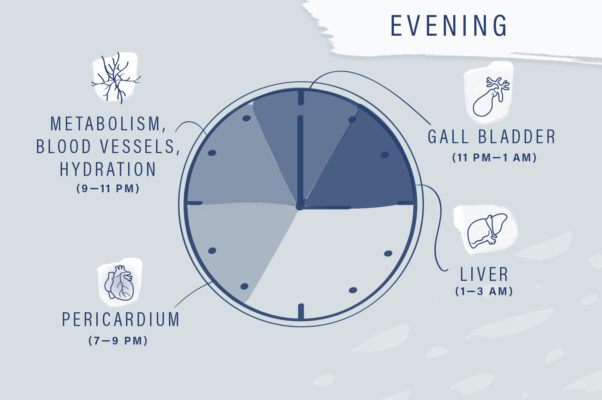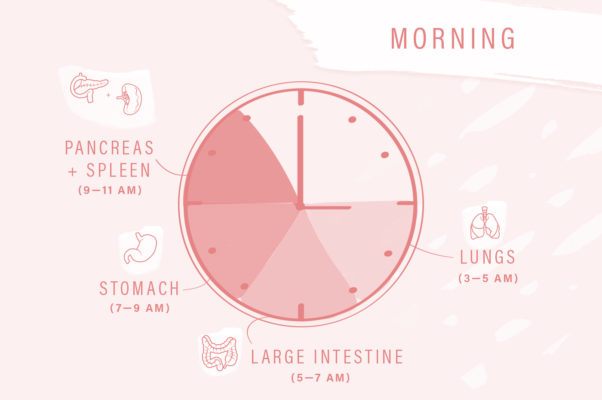Waking Up At Night? Traditional Chinese Medicine Might Have Answers
2020 was filled with some emotional turmoil, grief, and transitions, which my body translated into waking me up at 3:20 a.m. each morning. “Why!?” I’d frustratingly cry out during my daily early morning rise. Enter Traditional Chinese Medicine (TCM), a system that is more than 2,500 years old.
- Katie Brindle, Katie Brindle is a Chinese medicine practitioner and author & founder of the Hayo’U Method.
- Tamsin Lee, DA[o]M, AEMP, Tamsin Lee, DA[o]M, AEMP, is a doctor of East Asian medicine, acupuncturist, and a NCCIH funded postdoctoral senior clinical researcher at the University of Washington. She is also the founder of Influential Point, a collective of acupuncturists committed to advancing diversity, equity, and inclusion in global healthcare.
Sleep and the TCM body clock
It's well-known that our bodies work on a 24-hour cycle, commonly referred to as circadian rhythm, and it governs a host of physical, mental, and behavioral systems (including sleep). In TCM, the body is governed by something called the organ body clock. It works with qi, which represents the vital energy around the body, and the balance of yin and yang which are nighttime and daytime energies, respectively. “The body needs to be balanced to function, and yin and yang is one mechanism to maintain balance,” says Tamsin Lee DA[o]M, AEMP, founder and CEO of Influential Point. “The balanced relationship between the two allows us to have quality rest.”
TCM breaks down the 12 main organs of the body and divides them into two-hour segments. For example, the hours of 7 to 9 a.m. are all about the stomach, making it an ideal time to eat breakfast and fuel up for the day as our body’s energy is focused there.

{{post.sponsorText}}
Out of the 12 organs, it’s the heart that runs the show. “In Chinese medicine, the brain is secondary to the heart, the commander of the body,” explains Katie Brindle, Chinese medicine practitioner and author & founder of the Hayo’U Method. The heart is like the CEO, and the liver is like the COO, the motor of the body responsible for ensuring that everything’s operating correctly and happening as it’s supposed to.” But like any engine, things don’t always run smoothly, so if you’re waking up in the middle of the night, it’s important to note the exact time because TCM might help you figure out what's going on.
What your wake-up time might be telling you
1 to 3 a.m: The Liver
According to TCM, we should turn in by 11 p.m. when the gallbladder sets out for work. By 1 a.m., the liver is in full action, and if it’s struggling to detoxify and monitor the rest of the body, it might be because there’s too much Yang energy, Brindle explains, that’s when we’re woken up and have disturbed sleep. “The liver is responsible for the nervous system and the detoxification of the blood,” says Brindle. “It’s really important that the body is at rest by the time this element comes into play, so the body is fully refreshed.”

Sometimes a few extra cocktails might be the culprit, but even if you haven’t been drinking, it's helpful to look into other aspects of your waking life. “The liver is also the organ of anger, frustration, resentment, and planning,” Brindle says. “If you’re feeling blocked at work, overstretched, or your nervous system’s in shreds, often that’s going to wake up the liver alongside the detoxification process too,” she adds.
3 to 5 a.m.: The Lungs
When we think of our emotions, particularly sadness and grief, we often gesture toward our hearts; however, TCM suggests sadness and grief live in the lungs. “If you’re holding onto stresses and strains and not relaxing and letting go of things that are bothering you, that’s all to do with the lungs,” shares Brindle. Additionally, if you’re feeling lost or unaligned in your work or personal life, the lungs will also be affected as they can represent your place in the world.

When viewed this way, 3:20 a.m. my wake-up calls finally made sense. But if you cannot pinpoint any unprocessed misery, you might work with a TCM practitioner to help you look at your lifestyle. For instance, it might be time to ensure you’re moving your body and breathing in good quality air during the day, or you can consider getting yourself some house plants.
How to improve sleep with TCM
The truth is when you’re waking up in the middle of the night, there’s no quick fix, but what we can do is implement TCM practices during the day up that can help us catch some quality zzzs. Some of those include staying hydrated throughout the day, taking time for self-care (and quality time with loved ones), and getting in some gentle stretching. Many TCM practitioners suggest structuring your day to take advantage of your body's natural rhythm.
If you’re still struggling to get ample shut-eye and you’ve made lifestyle changes, it may be time to visit an East Asian Medicine (EAM) practitioner, advises Dr. Lee. “Sleep is intimately personal to each person, and it’s important to seek a treatment that addresses the whole person—physical, emotional, mental, and spiritual.”
Oh hi! You look like someone who loves free workouts, discounts for cult-fave wellness brands, and exclusive Well+Good content. Sign up for Well+, our online community of wellness insiders, and unlock your rewards instantly.
Loading More Posts...